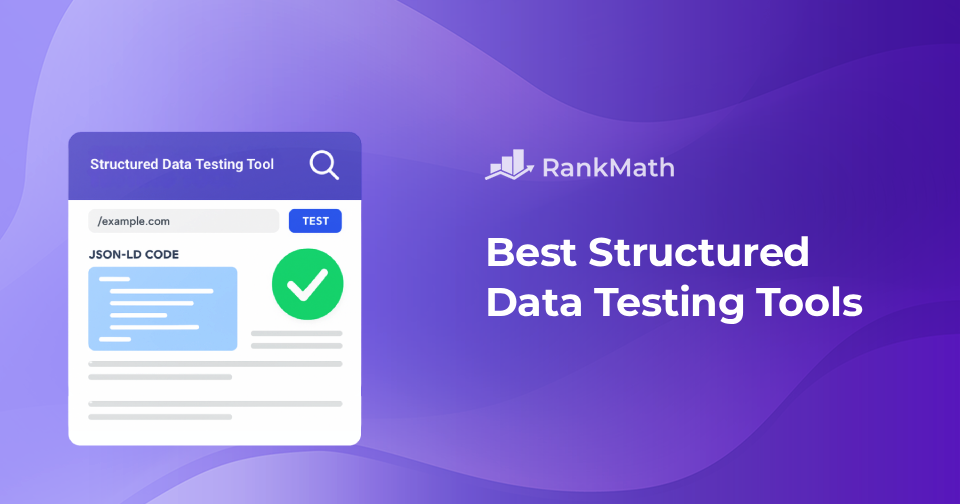Ever wondered why your website content doesn’t appear in rich results, even after adding structured data? The issue isn’t just adding it; it’s adding it correctly.
Structured data only works if search engines can read it without errors. Mistakes or incomplete markup mean your content won’t qualify for those eye-catching results.
Structured data testing tools solve this problem. They let you check, validate, and refine your Schema before it goes live, highlighting errors and showing how search engines interpret your code.
In this post, I’ll cover the best structured data testing tools available today, why they matter, and how to ensure your Schema works the right way.
Table Of Contents
- What is a Structured Data Testing Tool?
- Why Are Structured Data Testing Tools Important?
- Ensuring Eligibility for Rich Results
- Supporting SEO Performance
- Identifying Common Errors Early
- Maintaining Reliable Markup Over Time
- The Must-Have Structured Data Testing Tools for SEO
- Rank Math SEO
- Google Rich Results Test
- Schema.org Validator
- Bing Markup Validator
- JSON-LD Playground
- Frequently Asked Questions
- Your Next Steps With Structured Data
1 What is a Structured Data Testing Tool?
A structured data testing tool (often called a Schema markup validator or Schema checker) checks if your Schema markup is valid and properly set up.
It works by analyzing formats like JSON-LD, Microdata, or RDFa from either a URL or pasted code, letting you see how search engines and validators interpret your data.
Some tools are built by search engines themselves, which not only validate syntax but also check if your content qualifies for rich results. Others are platform-neutral or designed as developer sandboxes, letting you test and refine your markup before publishing.
2 Why Are Structured Data Testing Tools Important?
There are reasons why you should use these structured data testing tools. Here are some of them:
2.1 Ensuring Eligibility for Rich Results
Structured data testing tools confirm whether Schema markup meets the requirements for rich results. Without testing, even a minor error can prevent features like star ratings, product details, or FAQs from appearing in search results.
2.2 Supporting SEO Performance
These tools help validate that structured data is clear enough for search engines to understand. Well-implemented Schema improves comprehension, increases engagement rates, and can drive higher click-through rates. When the markup is tested, users see more accurate details in search, which often leads to lower bounce rates.
2.3 Identifying Common Errors Early
Testing tools flag issues that often go unnoticed, such as syntax mistakes in JSON-LD, missing required fields, or Schema injected with JavaScript that doesn’t render for crawlers. Identifying these problems before publishing prevents wasted effort and lost visibility.
2.4 Maintaining Reliable Markup Over Time
Schema can break when sites are updated, plugins change, or new content is added. Structured data testing tools provide an ongoing check, making sure the markup remains valid and continues to support SEO performance long after the initial setup.
3 The Must-Have Structured Data Testing Tools for SEO
Now let’s walk through the top tools you can use to test and validate your structured data, so you can be confident your Schema is correctly implemented.
3.1 Rank Math SEO
Rank Math is the #1 SEO plugin and the best structured data testing tool for WordPress, offering a suite of features to enhance your website’s search engine visibility.
Among its features, Rank Math provides a Schema Markup module that lets you add structured data to your content. This feature supports various Schema types, including Article, Product, Recipe, and more, enabling rich snippets in search results.
To validate your Schema, navigate to your post/page editor and go to the Rank Math meta box. Next, open the Schema tab and select the Schema you’ve applied.
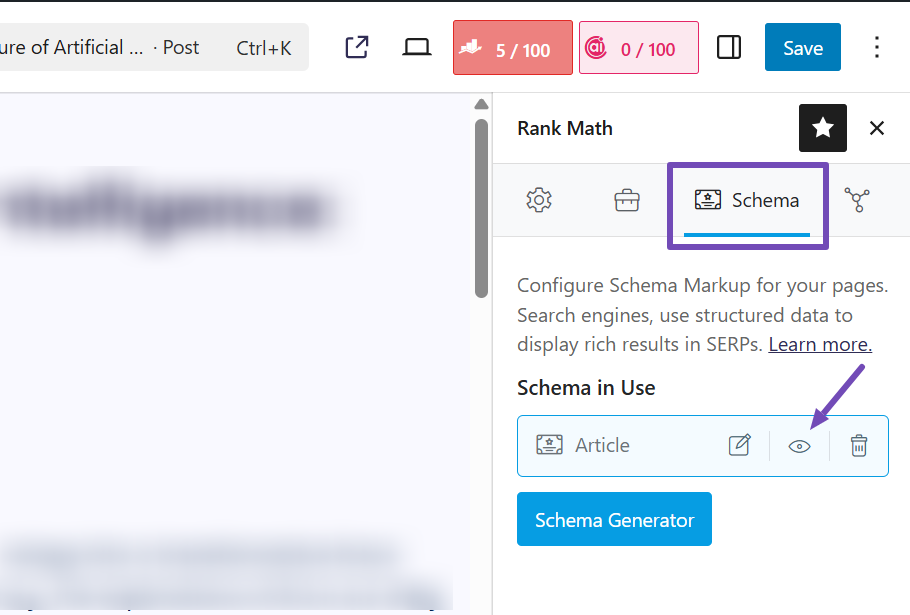
From there, navigate to the Code Validation tab. You can preview the JSON-LD code, and by clicking the ‘Test with Google’ button, it will take you to the Google Rich Results Test with the code already filled in.
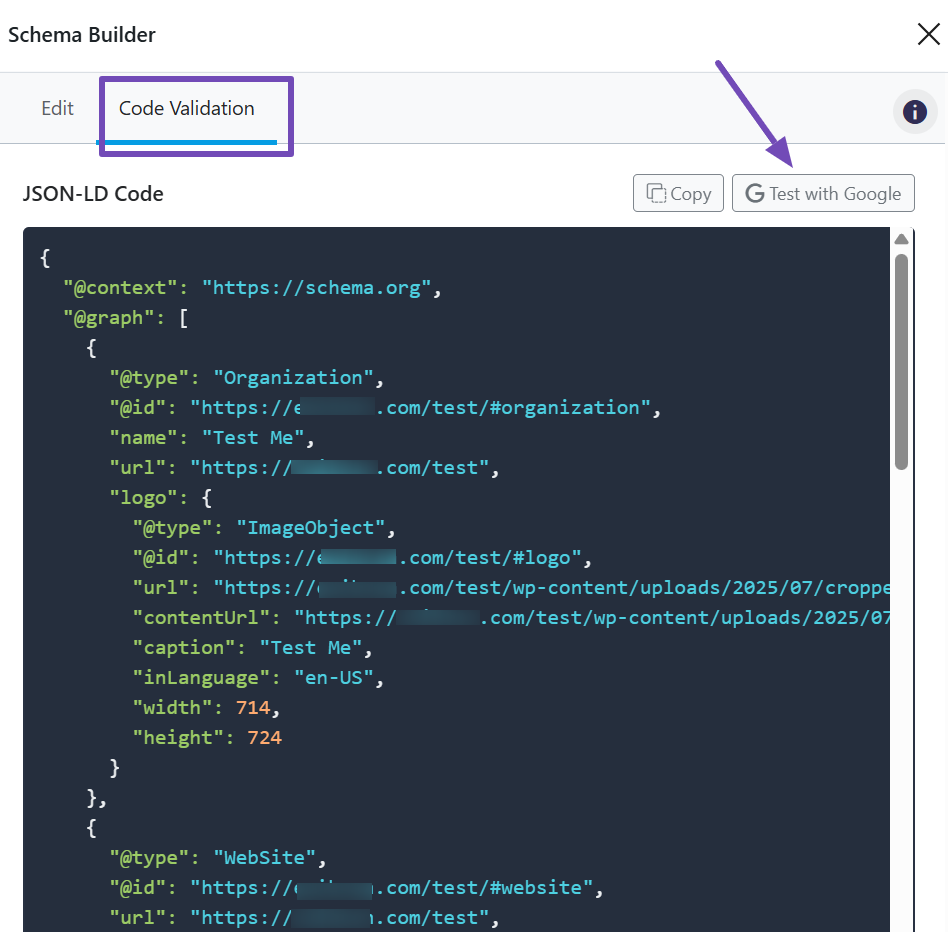
Then you can test to see if your structured data is valid and ready for search.
This integration enables you to quickly and easily verify that your Schema markup is correct, all within WordPress, giving you confidence that your structured data will function as intended.
3.2 Google Rich Results Test
Google’s Rich Results Test allows webmasters to test their pages for eligibility to display rich results in Google Search.
It helps you determine whether your pages can trigger rich results, such as star ratings, event snippets, or carousels, in search.
You can test a live URL or paste your code, and it supports JSON-LD, Microdata, and RDFa. By default, it tests with a smartphone user agent, but you can also select a desktop user agent.
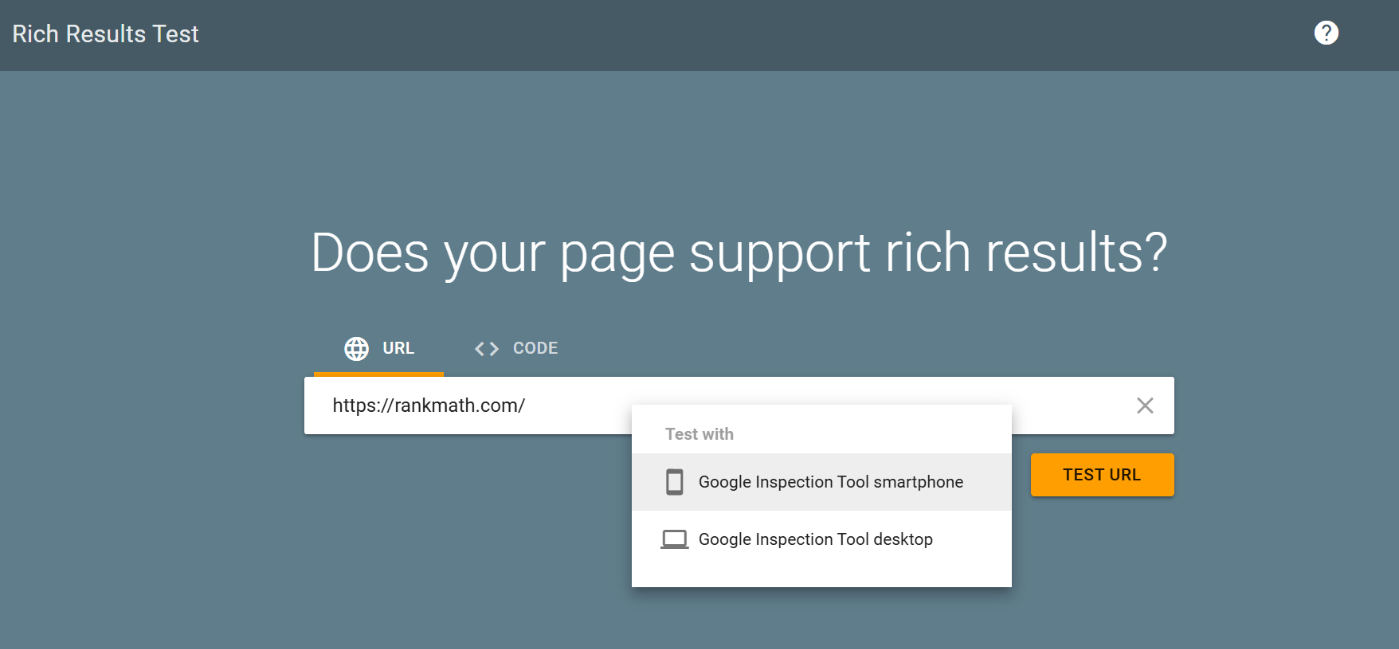
After testing, it provides a clear breakdown of structured data on the page, highlighting eligible rich results, warnings for missing fields, and a preview of how the page may appear in search results.
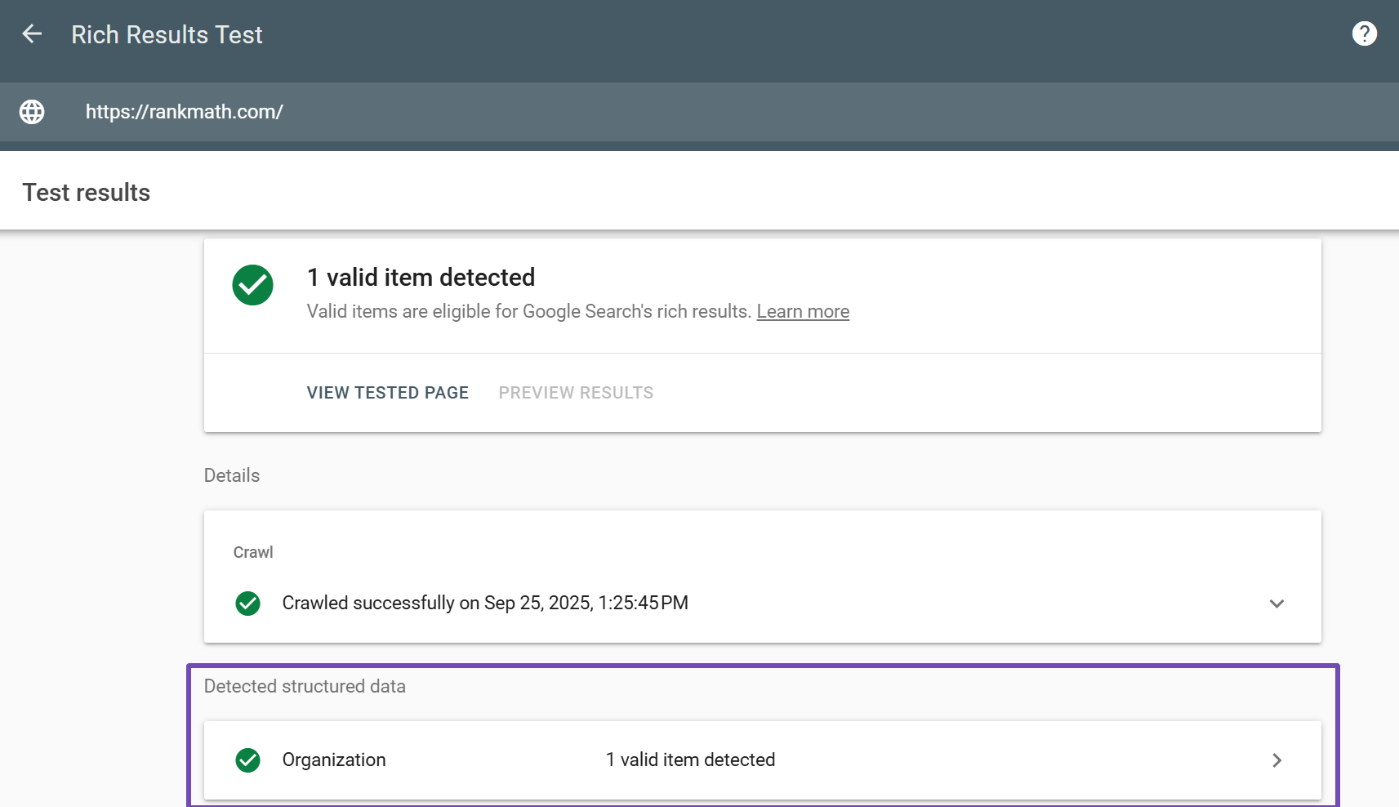
The main limitation is that it’s Google-specific, so it won’t show how your markup performs on Bing or other search engines.
Even so, when paired with Google Search Console, it gives a solid understanding of how your structured data is performing.
3.3 Schema.org Validator
If you want a tool that checks your structured data without being tied to any specific search engine, the Schema.org Validator is the one to use.
It’s the successor to Google’s old Structured Data Testing Tool, and it’s built to validate all Schema.org-based markup. This free Schema checker supports JSON-LD, RDFa, and Microdata, making it a reliable option for a neutral alternative to search engine-specific tools.
You just need to type in your live URL or paste the raw code into the available field and test.
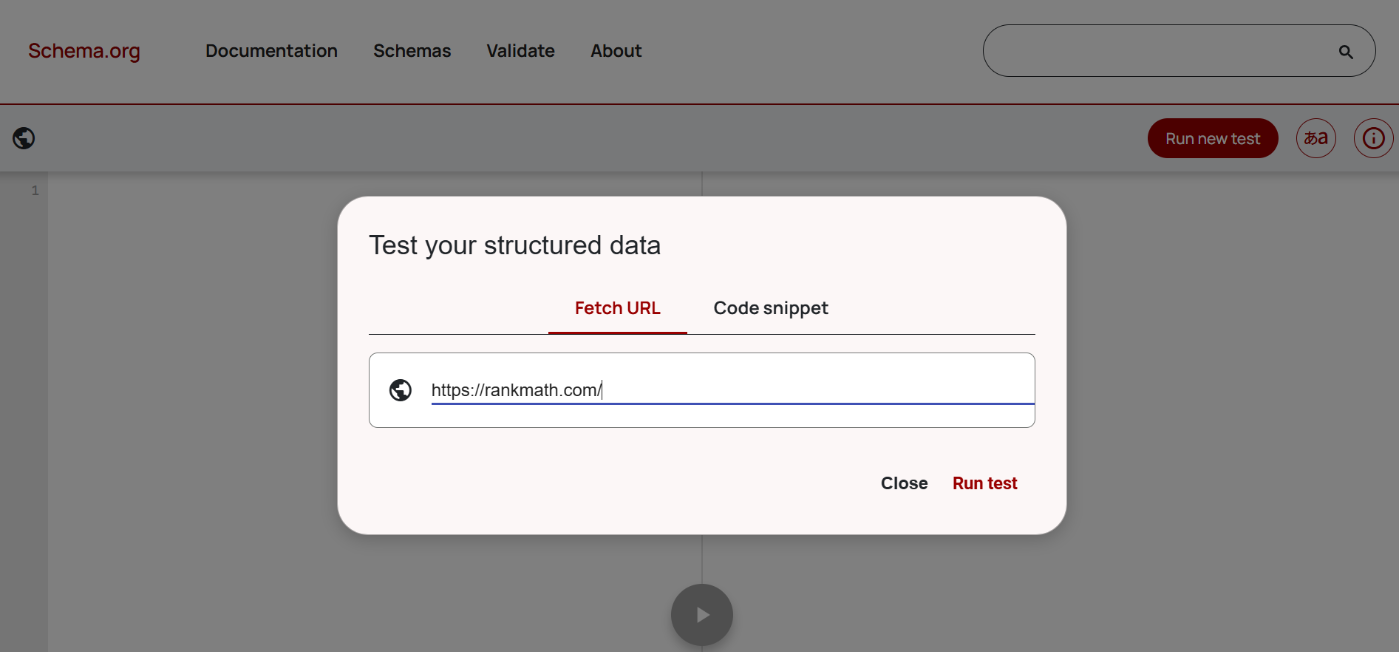
Upon testing, the validator will display exactly how your structured data is structured, flag any syntax errors, and provide a clear overview of what’s on the page.
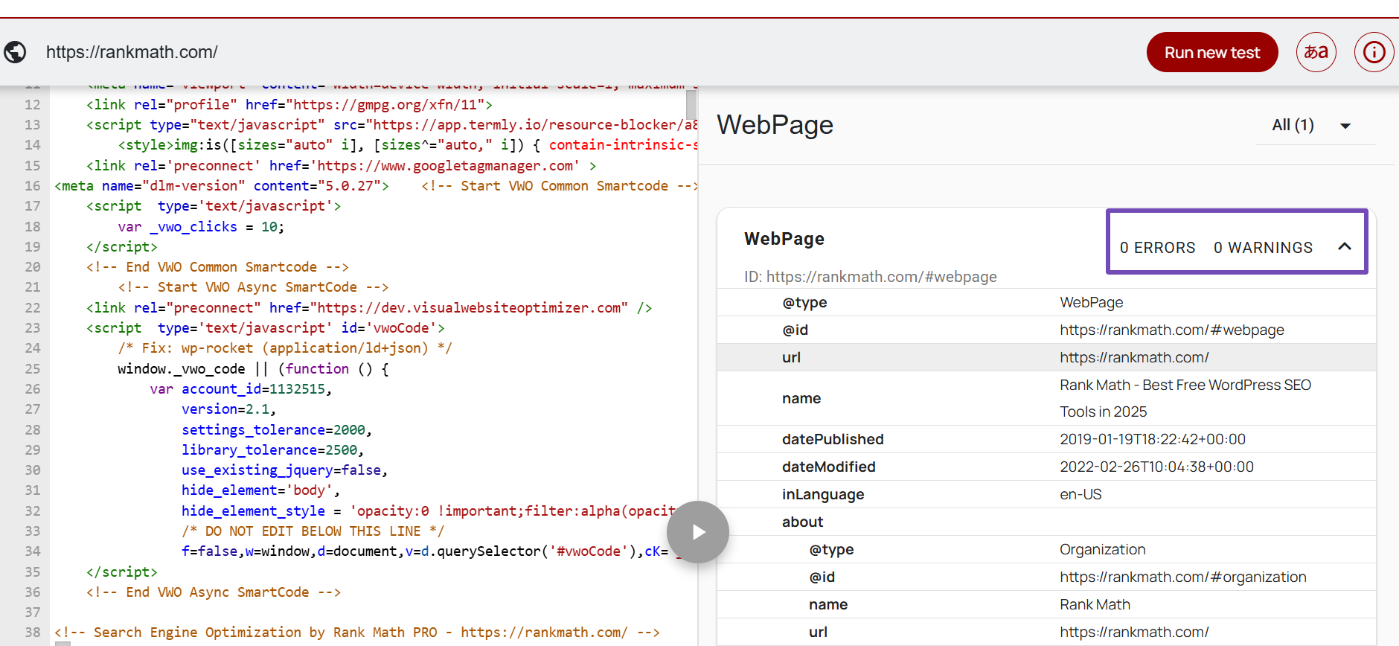
The biggest advantage is its neutrality, since it doesn’t focus on Google or Bing. You can be confident that your markup follows Schema.org standards.
The only thing to keep in mind is that it does not guarantee whether your structured data will yield rich results in search engines.
So you will need search engine-specific tools, such as Google’s Rich Results Test or Bing’s validator, for that. Overall, it is the go-to solution for ensuring your structured data is clean, correctly implemented, and future-proof.
3.4 Bing Markup Validator
If you’re optimizing for Bing, the Bing Markup Validator is a straightforward tool to ensure your structured data is correctly implemented. It supports various markup formats, including JSON-LD, Microformats, Open Graph, and HTML Microdata.
To access the Bing Markup Validator, log in to Bing Webmaster Tools and navigate to the URL Inspection section.
Then insert your URL in the field and hit the Inspect button. Just keep in mind that this must be a URL related to your verified domain in Bing. If not, it won’t work.

Once the inspection is done, you can scroll down to the Markup card and click the found markup type to expand it. The detected format will show up.

Then, you can click on it further to expand it and view the details of your detected markup.
Unlike Google’s Rich Results Test, it doesn’t show a preview of how your page will appear in search results, but it gives detailed feedback on correctness. Fixing the issues it flags can help improve your site’s visibility and performance on Bing.
3.5 JSON-LD Playground
If you work with only JSON-LD, the JSON-LD Playground is a tool you don’t want to skip. You can paste your markup or use built-in examples like Person, Event, Product, Recipe, and more.
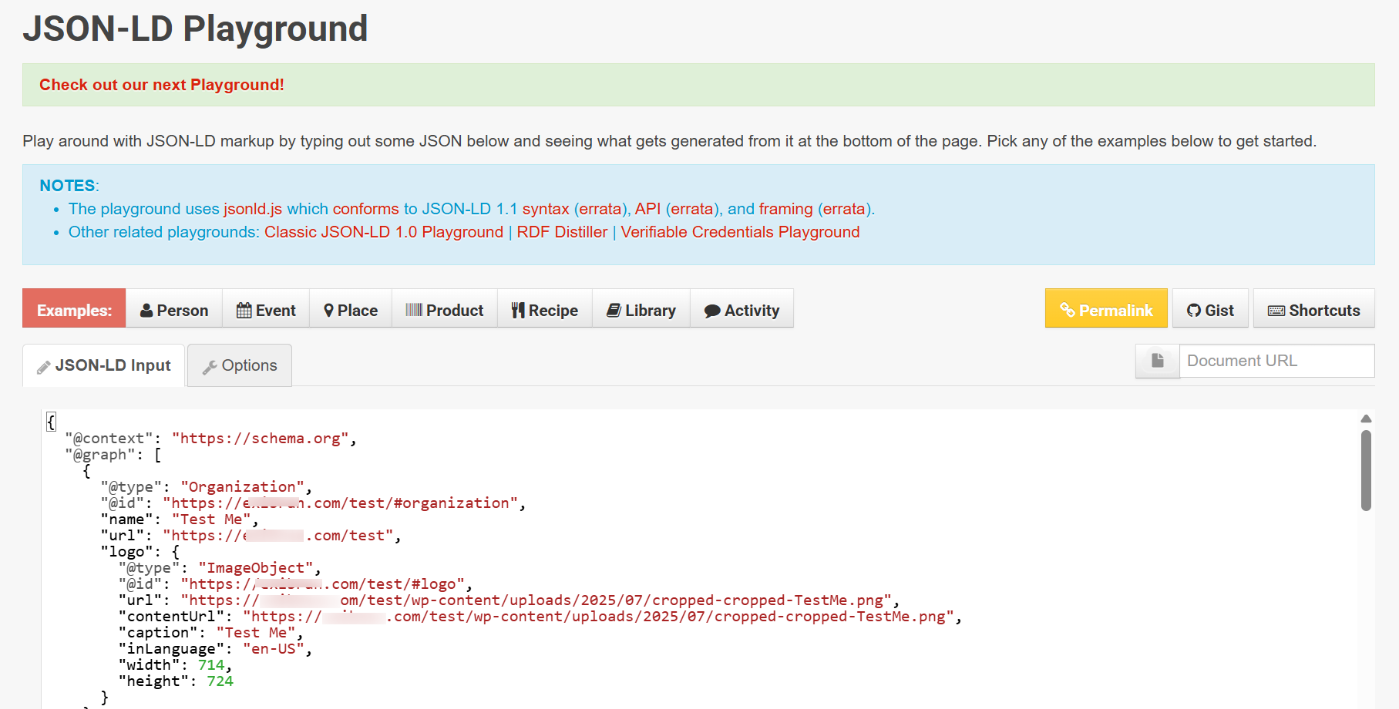
One of its best features is real-time processing, allowing you to see the data’s structure immediately as you edit. You can view it in expanded, compacted, or framed modes, and there’s even a visual graph that makes debugging easier.

The Playground also auto-completes fields like @context, @id, and properties, saving time and reducing errors.
You can even run it locally, making it perfect for testing on a localhost or offline environment.
The main limitation is that it only supports JSON-LD, making it a specialized JSON-LD validator; therefore, other formats, such as Microdata, aren’t covered.
Overall, it’s a hands-on, developer-friendly sandbox that helps you refine structured data quickly, catch errors before they hit production, and prototype complex Schemas like FAQ or HowTo efficiently.
4 Frequently Asked Questions
Why does my Schema validate, but does not show rich results in Google?
Validation only confirms that you’ve been able to validate structured data and that it’s technically correct. Google still determines whether your content qualifies for rich results based on factors such as quality, relevance, and whether your site meets its guidelines. Passing validation doesn’t guarantee rich snippets; it just makes you eligible.
How can I test structured data directly inside WordPress?
With Rank Math SEO, you can test Schema without leaving your WordPress site. After adding Schema to a post or page, go to the Rank Math Meta Box → Schema tab → select the Schema in use → Code Validation tab. There, you can preview the JSON-LD code and use the Test with Google button to check it directly in Google’s Rich Results Test.
When should I test the structured data on my site?
You should test during development, before publishing, and after any updates that might affect your Schema (like theme changes, plugin updates, or new content types). Testing regularly helps you catch issues before they hurt your search performance.
Can structured data improve my rankings?
Not directly. Schema markup doesn’t increase rankings by itself, but it improves how your pages appear in search results. Rich results can boost click-through rates, which indirectly supports your SEO performance.
5 Your Next Steps With Structured Data
Structured data is one of the fastest ways to boost how your content appears in search, but only if it’s set up correctly. Testing your Schema before and after publishing removes the guesswork and ensures your site is eligible for rich results.
Start simple: use Rank Math if you’re on WordPress to add Schema directly within your site. Then, validate with free Schema checkers, such as Google’s Rich Results Test or Schema.org Validator, to confirm everything works as expected.
Make it a routine. Test during development, after publishing, and whenever you update your content.
This small habit can mean the difference between showing up as plain blue links or capturing attention with star ratings, FAQs, and product details that drive clicks.
If you like this post, let us know by Tweeting @rankmathseo.
